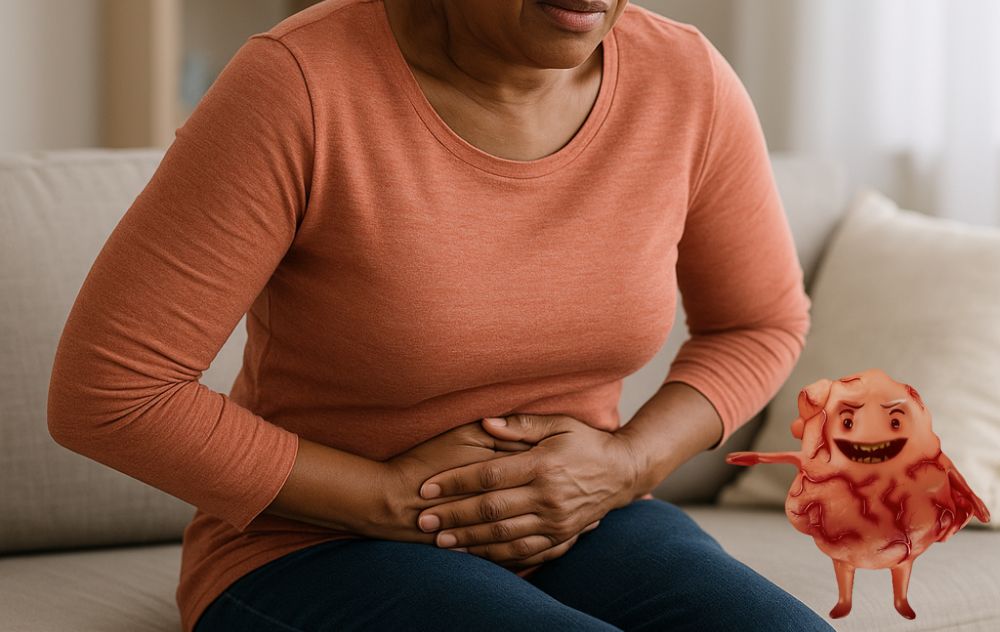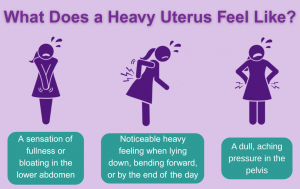
A persistent feeling of heaviness in the uterus or pelvic area can be concerning, especially when the cause is uncertain. For some, it manifests as a dull ache; for others, it feels more like a deep pressure in the lower abdomen. Several conditions can trigger this sensation, but one often overlooked reason why a uterus feels heavy is uterine fibroids. These noncancerous growths develop in or around the uterus, and depending on their size or location, fibroids can create a heavy feeling in the uterus.
Understanding the underlying cause of the uterus feeling heavy is the first step toward finding effective treatment and relief.
What Does a Heavy Uterus Feel Like?

Is The Feeling of Heaviness in the Pelvic Area Normal?
Having a uterus that feels heavy is more common than one might think, especially before or during menstruation.
While occasionally experiencing a mild feeling of heaviness in the pelvic area can be normal, do not ignore this sensation if it persists or worsens.
What Can Cause a Heavy Feeling in the Uterus?
A heavy feeling in the uterus is often a result of menstruation, with fluctuating hormones causing bloating and pelvic pressure. However, if the heavy feeling persists beyond your period, causing discomfort in daily life, it may be linked to an underlying condition requiring treatment.
Reasons that can cause a uterus that feels heavy include:
- Fibroids: Noncancerous growths in the uterus can press against the uterus or nearby organs, causing abdominal pressure, fullness, and heaviness.
- Adenomyosis: A condition that occurs when the uterine lining grows into the muscle wall, thickening the uterus to the point that it leads to a heavy, aching sensation.
- Menstruation: Hormonal changes during your period can cause bloating and pelvic pressure.
- Constipation: Digestive issues may mimic uterine heaviness.
- Early Pregnancy: A growing uterus can create pressure and fullness.
- Pelvic Inflammatory Disease (PID): Infection and inflammation in the reproductive organs may cause discomfort.
- Ovarian Cysts: Fluid-filled sacs located in the ovaries that may cause bloating or a feeling of heaviness in the lower abdomen.
- Endometriosis: A condition in which tissue similar to the uterine lining grows outside the uterus, which can also cause pressure and pain in the pelvic area.
ARE YOUR SYMPTOMS FROM FIBROIDS?
How Fibroids Cause Heaviness in the Pelvic Area
Fibroids can cause a feeling of heaviness in the pelvic area due to two main factors: the location of the fibroid and its type.
The Fibroid Location
Three main types of fibroids grow in different areas in and around the uterus. Of these three types of fibroids, only two are likely to cause a uterus to feel heavy. These two fibroid types include:
- Subserosal fibroids: This type of fibroid grows on the outside of the uterus, pressing on the bowel or bladder and causing additional symptoms such as heavy or prolonged periods, back or pelvic pain, abdominal bloating, and frequent urination.
- Intramural fibroids: This fibroid type enlarges the uterus, causing pressure and fullness.
- Pedunculated Fibroids: Instead of growing round, these fibroids are thin, like stalks attaching to the uterine wall. They cause longer periods and abdominal pain.
Fibroid Size and Growth
Aside from the type of fibroid, the size can also affect whether there is a feeling of heaviness in the uterus. As fibroids grow over time, symptoms such as bloating and pelvic fullness typically increase.
Large fibroids can press on the bladder, rectum, or pelvic nerves, leading to significant heaviness in the uterus. Even small fibroids can cause discomfort, depending on their number and location.
Should You Be Concerned About Pelvic Pressure?
While often dismissed, the feeling of heaviness in the uterus can be a sign of an underlying concern. Seek medical attention if experiencing any of the following:
- Worsening or persistent heaviness in the pelvic area
- Severe enough symptoms that interfere with daily activities, comfort, or sleep
- If the feeling of heaviness occurs alongside irregular bleeding, very heavy periods, or signs of anemia, like fatigue, dizziness, or pale skin
Ready for a Diagnosis? Here’s Your Next Step
Since several conditions can cause heaviness in the uterus, a proper diagnosis is essential. Scheduling a consultation with a fibroid specialist allows for a thorough examination that can include a pelvic exam along with imaging tests, such as ultrasound or MRI, to determine if fibroids are causing a uterus that feels heavy.
Early diagnosis allows for more treatment options, including non-surgical approaches like uterine fibroid embolization (UFE). USA Fibroid Centers specializes in this non-surgical treatment option, which shrinks fibroids and relieves symptoms without the need for surgery. This outpatient procedure offers a faster recovery, allowing patients to return to their lives quickly with lasting symptom relief.
Schedule a consultation online today at USA Fibroid Centers. Our nationwide clinics accept most insurance, which you can verify in real-time when you schedule your appointment online.
Schedule Your Consultation Now
FAQs: Uterus Heaviness & Fibroid Awareness
Is a Heavy Feeling in the Lower Abdomen During Ovulation or Menstruation Normal?
It is normal to feel a heaviness in the lower abdomen during ovulation or menstruation, along with uncomfortable pressure and cramps, due to hormonal changes.
What Causes a Heavy Feeling in the Uterus When Not Pregnant?
A heavy sensation in the uterus can be linked to conditions like fibroids, endometriosis, pelvic inflammatory disease, or hormonal changes rather than pregnancy. A medical evaluation can help identify the cause and an effective treatment plan.
Do Fibroids Always Show up on a Pelvic Exam?
Fibroids do not always show up on a pelvic exam. Small or deeper fibroids often require imaging tests, such as an ultrasound, for detection.
Does a Tilted Uterus Cause a Heavy Feeling?
A tilted uterus typically doesn’t cause a heavy feeling, but it may lead to other symptoms like pain during intercourse.




